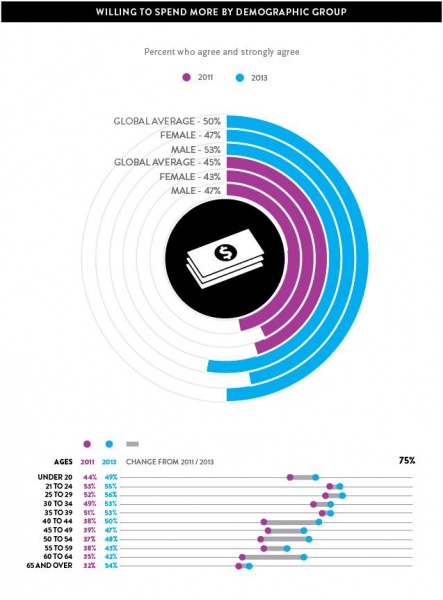The premise of creating shared value, introduced by competitive strategist Michael Porter and Mark Kramer, co-founder of the Foundation Strategy Group (FSG), is one that has caught on as companies emphasize their ability to make an impact through their core operations, in some ways de-emphasizing a separate “social responsibility” agenda. John Mackey and Raj Sisodia made a similar case for companies in their 2012 book “Conscious Capitalism,” which celebrates the “innate potential of business to make a positive impact on the world.”
Nielsen recently surveyed more than 29,000 online respondents in 58 countries to see whether any of this matters to consumers. As in 2011, in “The Global, Socially Conscious Consumer” report, we used stated willingness to spend more on goods and services from companies that have implemented programs to give back to society as a proxy for how much consumers care about brand investments in social impact. The results provide one simple gauge for whether consumers care—about cause marketing, shared value, conscious capitalism or other pursuits of corporate social impact—and they help to quantify the growing desire among consumers to reward the companies they view as socially responsible.
CONSUMERS INCREASINGLY CARE
In the latest survey, half of all respondents (50%) said they would be willing to reward companies that give back to society by paying more for their goods and services—up from 45 percent in 2011. The percentage of respondents who agreed increased among males and females and all age groups covered. While respondents under age 30 are still the most likely to say they’d spend more, the attitudes among respondents ages 40 to 54 are shifting most rapidly. Among consumers ages 40-44, for instance, 50 percent agreed that they would spend extra for goods and services from companies giving back to society, up from just 38 percent two years ago.

Other findings include:
- Willingness to spend more on socially-responsible products by country.
- Gap between willingness to spend more on socially-responsible products and self-reporting purchasing habits.
- Strategies for how to engage with socially-conscious consumers.



Share the News